Proper care of your piano will ensure many years of enjoyment. Regular maintenance, including tuning and inspections by a qualified technician, can help ensure the health and longevity of a piano.
Call our retail center, to get contact information for a qualified piano tuner/technician in your area.
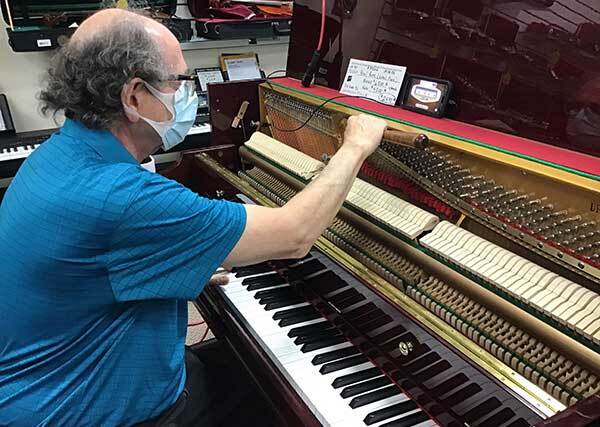
Pianos should be tuned regularly to maintain sound quality and to prevent potential damage to the instrument.
Pianos have more than 4,000 pounds of pressure on the plate and frame of piano, and over 250 strings. The strings stretch, and the instrument changes with atmospheric conditions, so, your instrument should be tuned regularly, even if it is not being played.
Piano tuning is the process of adjusting the tension of the strings on a piano to bring them to the correct pitch. This is done by tightening or loosening the tuning pins that hold the strings in place.
This should only be done by a professional piano tuner, who has the knowledge and tools required to accurately adjust the tension of each string.
The frequency with which a piano should be tuned can vary slightly depending on a number of factors, such as how often it’s played, the climate it’s kept in, and the age and condition of the instrument.
But, as a general rule, it’s recommended to have a piano tuned at least once a year. Twice per year is ideal.
Humidity and temperature can have a significant impact on the health and sound of a piano. Fluctuations in humidity and temperature can cause the wooden parts of the piano to expand and contract, which can lead to a number of problems.
High humidity can cause the wooden parts of the piano to swell and warp, which can affect the overall structure and stability of the instrument.
It can also cause the keys to stick and the action to become sluggish, making it difficult to play.
High humidity can also cause the metal strings and other metal parts of the piano to rust and corrode.
Low humidity can cause the wooden parts of the piano to shrink and crack. This can cause the soundboard to lose its ability to vibrate properly, resulting in a loss of sound quality.
Low humidity can also cause the piano’s tuning to become unstable, as the metal strings are more prone to stretching and contracting in dry conditions.
Temperature fluctuations can also have a negative effect on a piano. Extreme heat or cold can cause the wooden parts of the piano to expand or contract rapidly, which can cause cracking and warping. Changes in temperature can also cause the piano’s tuning to be less stable.
To prevent these issues, it’s important to keep a piano in a stable environment with consistent humidity and temperature levels. Ideally, the humidity should be kept between 40% and 60%, and the temperature should be kept between 60°F and 70°F.
A piano should be kept away from direct sunlight as it will cause daily fluctuations in the temperature level and sun-bleach many piano finishes. It’s also a good idea to avoid putting a piano right next to a wood-burning stove or fireplace.
Our team of piano tuners and technicians can also install a humidity control system within your piano if the atmospheric conditions call for it.
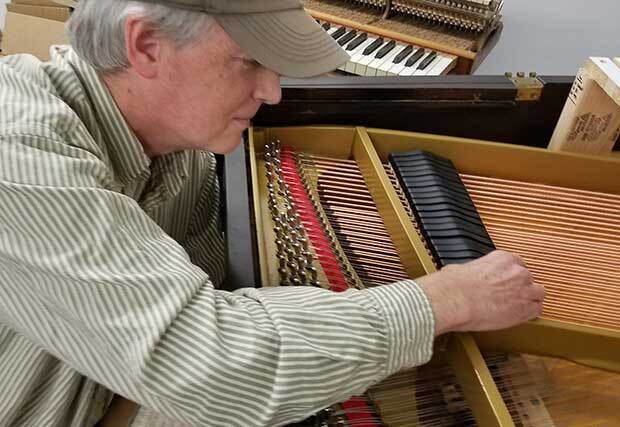
Piano regulation is the process of adjusting the mechanical parts of a piano’s action to ensure that it’s functioning properly and optimally.
The action of a piano includes all the moving parts that allow the keys to be played, such as the hammers, dampers, keys, and pedals.
Over time, the parts of a piano’s action can become worn or misaligned, which can result in problems such as uneven key touch, sluggish response, or inconsistent tone.
Piano regulation involves a series of adjustments to these parts to ensure that they are working together smoothly and efficiently.
A qualified technician will carefully examine the action and make any necessary adjustments to ensure that the key height, key dip, hammer blow distance, and other important factors are all properly set.
They may also replace worn or damaged parts, clean and lubricate the action, and make other adjustments as needed to achieve optimal performance.
Proper piano regulation can have a significant impact on the sound and feel of a piano. A well-regulated piano will have a more responsive touch, a more even tone, and a more consistent sound across all keys.
It can also make it easier and more enjoyable to play, which is important for pianists who perform regularly or for extended periods of time.
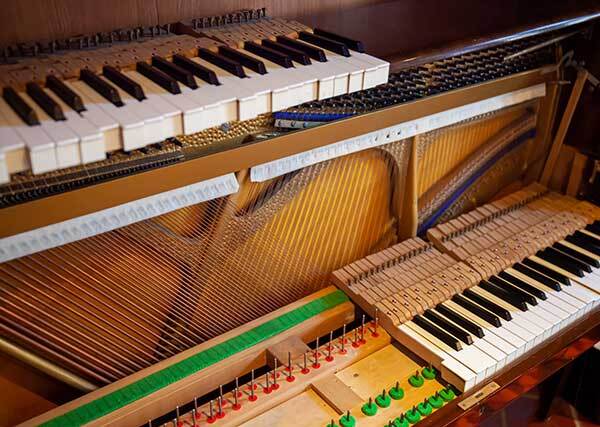
Piano regulation should be done by a qualified piano technician who has the knowledge and experience to make the necessary adjustments accurately and effectively. It is typically recommended to have a piano regulated every 3-5 years, depending on usage and other factors.
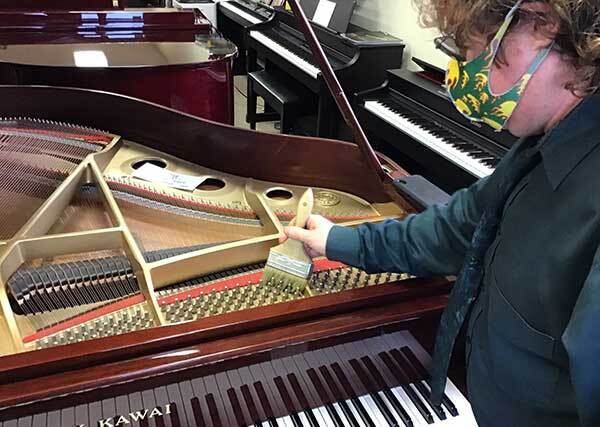
Here are some general steps to follow:
You can remove the music desk on your grand piano and gently vacuum around the tuning pins every 3-6 months, using a soft bristle brush attachment.
Avoid touching the strings with your hands. If the strings are dusty, you can gently vacuum them. If the soundboard is dusty, please ask your piano tuner/technician to clean under the strings when you have the piano tuned.
If your piano has a high-polished polyester finish, the best solution is a professional piano polish you can buy at our retail center. You can also use a very mild, diluted solution of 1 part alcohol to 10 parts water. This should be misted onto the piano case and keys and removed immediately with a micro-fiber or other very soft cloth.
Avoid using “Windex” or other window cleaners the have ammonia in them.
If your piano has a furniture lacquer finish like Cherry, Mahogany, Oak or Walnut, you can use a high-quality furniture polish on the wood portions of the piano.
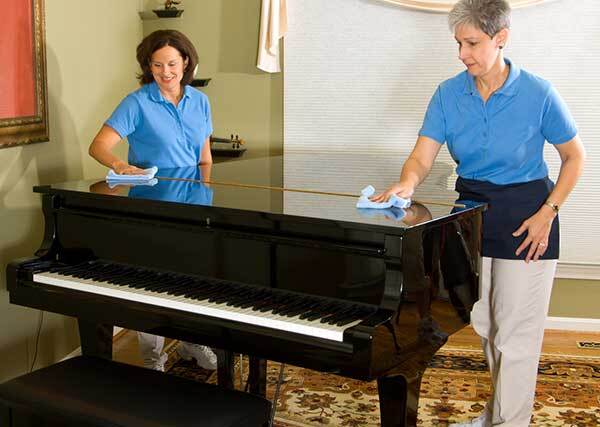
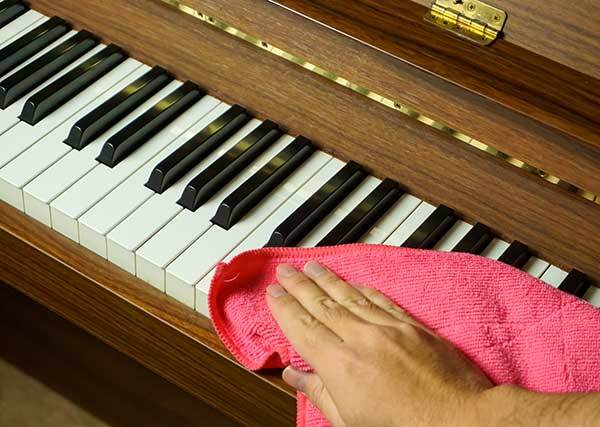
If the keys are dirty or have built-up grime, you can clean them with a damp cloth or a very mild, diluted solution of 1 part alcohol to 10 parts water. Be sure to use a soft cloth and avoid leaving excessive moisture on or between the keys.
If your piano has metal parts, such as pedals or hardware, you can clean these with a soft cloth or a specialized metal cleaner. Be sure to avoid using any abrasive materials that could scratch the metal.
It’s important to note that different types of pianos may require different cleaning techniques, depending on the type of finish, materials, and other factors.
Check out our blog for more detailed information on caring for your piano.
If you’re not sure how to clean your particular piano, it’s always a good idea to consult our qualified piano technicians or ask for advice at our retail center.
Website Design and Development by Evans Alliance